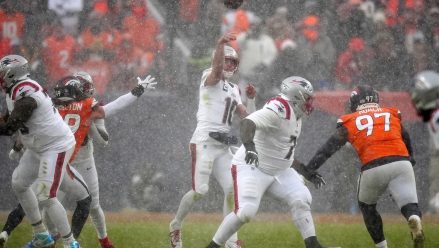Chris Dierkes just wrote the IRS a very big check. The professional gambler pays quarterly taxes, does everything by the book, and welcomes scrutiny. But come January 2026, he’s looking at a nightmare scenario that could push him out of the sports betting world.
“That could force me to consider quitting altogether,” he said.
Welcome to the unintended(?) consequences of President Trump’s “One Big Beautiful Bill,” which includes a seemingly modest change to gambling loss deductions that threatens to blow up professional gambling while generating far less revenue than projected. Starting in 2026, gamblers can only deduct 90% of their losses against winnings — a tweak designed to raise $1.1 billion over 10 years that industry insiders say will more likely encourage widespread tax fraud.
The mathematics are brutal for anyone operating on thin margins. If you win $100,000 and lose $100,000, under the old rules, you owed nothing on gambling income. Under the new rules, you can only deduct $90,000 in losses, leaving $10,000 in taxable “phantom income” on money you never actually netted.
For high-volume, low-ROI players — the backbone of professional sports betting — this isn’t just a tax increase. It’s an existential threat. And it’s looking more and more likely, barring some last-minute heroics, that the increase will be in effect come 2026.
The sessions problem
The law’s impact hinges on a technical definition that could make or break entire segments of the gambling industry: What constitutes a “session?” (Nobody knows.)
Bettors might be able to use session accounting, which is treating gambling activities as a block rather than as individual wagers. If sessions are defined as quarterly periods, Dierkes said he could live with the change. If they’re defined as individual bets, “my effective tax rate would jump from 35-37% into the 80-90% range.”
This matters most for poker players and tournament grinders, where every buy-in gets treated as a separate session. Add in re-buys, and the taxable entries multiply rapidly. Combined with W-2G forms for big wins — anything over $5,000 or $10,000 in tournaments — and poker faces a paper trail that makes creative accounting nearly impossible.
“It’s very damaging to poker,” said an anonymous professional gambler who has been in the game for years. “It effectively kills poker if players are reporting correctly.”
Dierkes was more blunt: “I could see the high-roller tournament scene die in 2026.”
Enforcement reality
Here’s where the revenue projections start falling apart. The Joint Committee on Taxation expects $1.1 billion over 10 years, but that assumes current reporting levels continue. Industry insiders expect the opposite.
“If sessions are interpreted harshly, people will underreport, quit working, or find loopholes,” Dierkes said. “That reduces revenue, not increases it.”
The enforcement math works against the IRS. Audit rates have been less than 2%, probably closer to 0.2% now, and most gambling income lacks the paper trail that triggers scrutiny. An anonymous professional put it simply: “And most people don’t care until they get audited.”
Sports betting operates in a particularly gray zone. While slots and poker tournaments generate W-2G forms that create undeniable records, most sports bets fly under the radar. The professional estimated that sharp bettors split their action roughly 60% offshore, 10% on prediction markets, and 30% on legal books. Offshore action rarely gets reported accurately, if at all.
“Any income earned anywhere in the world by an American is taxable,” the anonymous gambler noted. “To be transparent, I track everything in a spreadsheet. At the end of the year, I dump out net wins and expenses. I don’t exclude offshore stuff, but I may be a little more liberal with it than I am with regulated play.”
Translation: There’s already widespread underreporting. The new law provides even more incentive to fudge the numbers.
Carnage, by type
Poker faces the harshest impact because of W-2G exposure and the session structure. Tournament players routinely hit reporting thresholds, creating an unavoidable paper trail. The anonymous gambler predicted many players will “keep underreporting, just like now,” but acknowledged the risks increase significantly for anyone with documented wins.
Sports betting is split between regulated and offshore lines. Professionals with significant regulated book action face new pressures, but those operating primarily offshore maintain the same incentives to underreport they’ve always had. The key difference: This law pushes more action toward jurisdictions with less oversight.
Slots and casino gambling get hammered by W-2G requirements on jackpots over $1,200. High-denomination players routinely trigger reporting thresholds, making creative accounting nearly impossible. “They’re black-and-white because W-2Gs get issued,” Dierkes said.
Horse racing faces similar challenges with W-2 issuance, though the anonymous gambler noted this could affect the entire ecosystem by making tax implications “less favorable” for bettors, potentially reducing overall volume.
Workarounds
Faced with punitive tax rates, professionals are already exploring alternatives. Some will migrate to prediction markets like Kalshi, which offer potential capital gains treatment instead of ordinary income rates. Others will push more action offshore or into cryptocurrency, making detection harder.
The anonymous professional mentioned that some gamblers create offshore corporate structures in places like the Caymans or Isle of Man, while they pay themselves a “salary” on gambling profits. “It keeps income offshore and more controlled,” he said, though he acknowledged the complexity of such arrangements.
Most telling, both professionals expect widespread adoption of the restaurant industry approach: Keep two sets of books — one for real, one for the taxman.
Timelines
The immediate impact in 2026 may be muted by confusion and adaptation. The real reckoning comes later. Taxes filed in 2027 can be audited through 2028-2029, creating a delayed enforcement cycle that obscures the law’s true effects.
“That’s when issues show up,” the anonymous professional said.
This timeline works against revenue generation. If the IRS lacks resources to audit aggressively — and current audit rates suggest they do — the law becomes largely voluntary for anyone not generating W-2G forms. For those who are generating them, the incentive to find workarounds intensifies.
Revenue mirage
Both professionals rejected the $1.1 billion revenue projection outright. Dierkes called the bill’s creation “incompetence” by lawmakers who “don’t understand gambling.”
An anonymous professional was particularly skeptical: “For 99% of players, the difference between how they should file and how they do file is tiny. High-net-worth players will figure out workarounds. Everyone else will keep doing what they’ve always done.”
In other words, the law targets the wrong group. It devastates the small number of professionals who report honestly while having minimal impact on the vast majority of recreational players who already underreport — or don’t file gambling taxes at all.
The most likely outcome isn’t increased compliance or higher revenues. It’s a market where different types of gambling face vastly different enforcement realities.
Poker tournaments and high-denomination slots, with their unavoidable W-2G paper trails, see sharp declines in professional participation. Some tournaments might struggle to attract fields; others might see pros simply stop playing in the U.S.
Sports betting sees accelerated migration to offshore platforms and prediction markets. The regulatory arbitrage already exists — this law just makes it more compelling. Legal sportsbooks lose sharp action to jurisdictions with more favorable tax treatment.
Horse racing faces potential volume declines as the tax implications become less attractive for serious players, though the full impact depends on how aggressively the tracks issue W-2 forms.
Throughout it all, recreational players largely continue doing what they’ve always done: Not reporting much of anything. The 90% rule affects them in theory but not in practice.
Bottom line
Trump’s gambling tax represents a masterclass in policy backfire. Designed to raise over $1 billion by closing a perceived loophole, it instead creates massive incentives for tax avoidance while impacting the few professionals who file honestly.
The law encourages exactly the behavior it seeks to curtail: underreporting gambling income. It pushes action toward less regulated platforms and jurisdictions. It potentially kills entire segments of the domestic gambling market while generating far less revenue than projected.
The house always wins? Usually. But in this case, the house — namely, the U.S. Treasury — is playing a losing hand.







